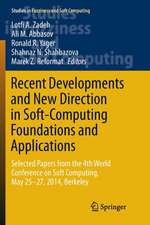Advances in Neuroergonomics and Cognitive Engineering: Proceedings of the AHFE 2017 International Conference on Neuroergonomics and Cognitive Engineering, July 17–21, 2017, The Westin Bonaventure Hotel, Los Angeles, California, USA: Advances in Intelligent Systems and Computing, cartea 586
Editat de Carryl Baldwinen Limba Engleză Paperback – 13 iun 2017
Din seria Advances in Intelligent Systems and Computing
- 20%
 Preț: 1120.90 lei
Preț: 1120.90 lei - 20%
 Preț: 1090.59 lei
Preț: 1090.59 lei - 20%
 Preț: 1324.07 lei
Preț: 1324.07 lei - 20%
 Preț: 1989.79 lei
Preț: 1989.79 lei - 20%
 Preț: 1946.92 lei
Preț: 1946.92 lei - 18%
 Preț: 1273.28 lei
Preț: 1273.28 lei - 20%
 Preț: 2264.51 lei
Preț: 2264.51 lei - 20%
 Preț: 1337.27 lei
Preț: 1337.27 lei - 20%
 Preț: 1297.67 lei
Preț: 1297.67 lei - 20%
 Preț: 1315.82 lei
Preț: 1315.82 lei - 20%
 Preț: 1310.88 lei
Preț: 1310.88 lei - 20%
 Preț: 1302.62 lei
Preț: 1302.62 lei - 20%
 Preț: 882.20 lei
Preț: 882.20 lei - 20%
 Preț: 1305.93 lei
Preț: 1305.93 lei - 20%
 Preț: 1629.32 lei
Preț: 1629.32 lei - 20%
 Preț: 1345.49 lei
Preț: 1345.49 lei - 18%
 Preț: 1227.52 lei
Preț: 1227.52 lei - 18%
 Preț: 1290.64 lei
Preț: 1290.64 lei - 20%
 Preț: 1041.10 lei
Preț: 1041.10 lei - 20%
 Preț: 1034.52 lei
Preț: 1034.52 lei - 20%
 Preț: 1298.50 lei
Preț: 1298.50 lei - 20%
 Preț: 1330.67 lei
Preț: 1330.67 lei - 20%
 Preț: 1483.28 lei
Preț: 1483.28 lei - 20%
 Preț: 1971.64 lei
Preț: 1971.64 lei - 20%
 Preț: 1006.48 lei
Preț: 1006.48 lei - 20%
 Preț: 1471.75 lei
Preț: 1471.75 lei - 20%
 Preț: 1471.56 lei
Preț: 1471.56 lei - 20%
 Preț: 1454.40 lei
Preț: 1454.40 lei - 20%
 Preț: 1494.84 lei
Preț: 1494.84 lei - 20%
 Preț: 1269.64 lei
Preț: 1269.64 lei - 20%
 Preț: 1481.64 lei
Preț: 1481.64 lei - 20%
 Preț: 1192.08 lei
Preț: 1192.08 lei - 20%
 Preț: 1298.50 lei
Preț: 1298.50 lei - 20%
 Preț: 1489.07 lei
Preț: 1489.07 lei - 20%
 Preț: 825.78 lei
Preț: 825.78 lei - 20%
 Preț: 1649.93 lei
Preț: 1649.93 lei - 20%
 Preț: 1463.49 lei
Preț: 1463.49 lei - 20%
 Preț: 1438.77 lei
Preț: 1438.77 lei - 20%
 Preț: 1474.22 lei
Preț: 1474.22 lei - 20%
 Preț: 1298.50 lei
Preț: 1298.50 lei - 20%
 Preț: 1327.35 lei
Preț: 1327.35 lei - 20%
 Preț: 1973.31 lei
Preț: 1973.31 lei - 18%
 Preț: 947.04 lei
Preț: 947.04 lei - 18%
 Preț: 1441.39 lei
Preț: 1441.39 lei - 20%
 Preț: 638.55 lei
Preț: 638.55 lei - 20%
 Preț: 1320.76 lei
Preț: 1320.76 lei - 20%
 Preț: 1948.56 lei
Preț: 1948.56 lei
Preț: 995.89 lei
Preț vechi: 1244.87 lei
-20% Nou
Puncte Express: 1494
Preț estimativ în valută:
190.55€ • 198.98$ • 157.36£
190.55€ • 198.98$ • 157.36£
Carte tipărită la comandă
Livrare economică 15-29 aprilie
Preluare comenzi: 021 569.72.76
Specificații
ISBN-13: 9783319606415
ISBN-10: 3319606417
Pagini: 458
Ilustrații: XV, 458 p. 133 illus.
Dimensiuni: 155 x 235 mm
Greutate: 0.66 kg
Ediția:1st ed. 2018
Editura: Springer International Publishing
Colecția Springer
Seria Advances in Intelligent Systems and Computing
Locul publicării:Cham, Switzerland
ISBN-10: 3319606417
Pagini: 458
Ilustrații: XV, 458 p. 133 illus.
Dimensiuni: 155 x 235 mm
Greutate: 0.66 kg
Ediția:1st ed. 2018
Editura: Springer International Publishing
Colecția Springer
Seria Advances in Intelligent Systems and Computing
Locul publicării:Cham, Switzerland
Notă biografică
Dr. Baldwin teaches and conducts research in conjunction with the Human Factors and Applied Cognition program. She has over 15 years of experience investigating human factors issues in mental workload, surface and air transportation and cognitive aging. Her primary research interests are in the area of applied auditory cognition. Much of her work involves the use of neurophysiological measures (i.e., EEG, ERP, EKG, and eye tracking) to examine the effort expended when individuals perform multiple modality dual tasks as a function of changes in sensory or environmental condition and cognitive aspects of the task. Dr. Baldwin has an active line of externally funded research and is currently working in conjunction with sponsors such as the Office of Naval Research, National Highway Traffic Safety Foundation, Air Force Office of Scientific Research, National Science Foundation and the Department of Transportation. She has successfully completed multiple projects for the National Institutes of Health
She is the author of 14 peer-reviewed journal publications, one book, 12 book chapters and over 50 scientific conference proceedings to date.
She is the author of 14 peer-reviewed journal publications, one book, 12 book chapters and over 50 scientific conference proceedings to date.
Textul de pe ultima copertă
This book offers a broad perspective on the field of cognitive engineering and neuroergonomics, covering emerging practices and future trends toward the harmonious integration of human operators with computational systems. It reports on novel theoretical findings on mental workload and stress, activity theory, human reliability, error and risk, and neuroergonomic measures alike, together with a wealth of cutting-edge applications. Further, the book describes key advances in our understanding of cognitive processes, including mechanisms of perception, memory, reasoning, and motor response, with a special emphasis on their role in interactions between humans and other elements of computer-based systems. Based on the AHFE’s main track on Neuroergonomics and Cognitive Engineering, held on July 17–21, 2017 in Los Angeles, California, USA, it provides readers with a comprehensive overview of the current challenges in cognitive computing and factors influencing human performance.
Caracteristici
Reports on emerging practices for a better integration of human operators with computational systems Explores cognitive ergonomics research methods Places special emphasis on mental workload, decision-making, and skilled performance Covers the brain’s mechanisms of cognition such as perception, memory, reasoning, and motor response Includes supplementary material: sn.pub/extras

























